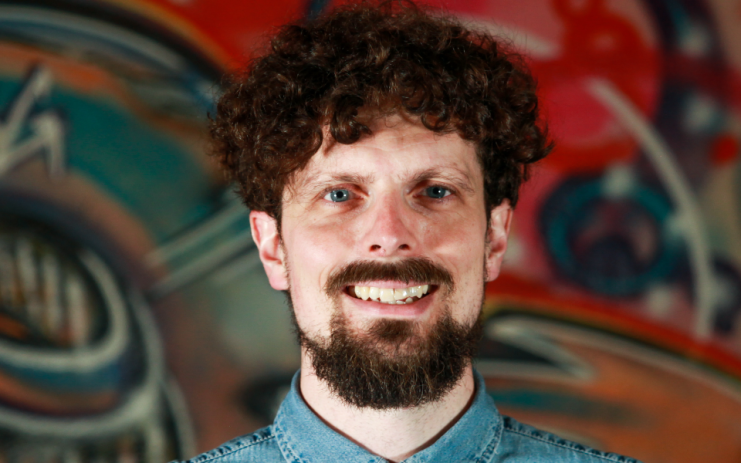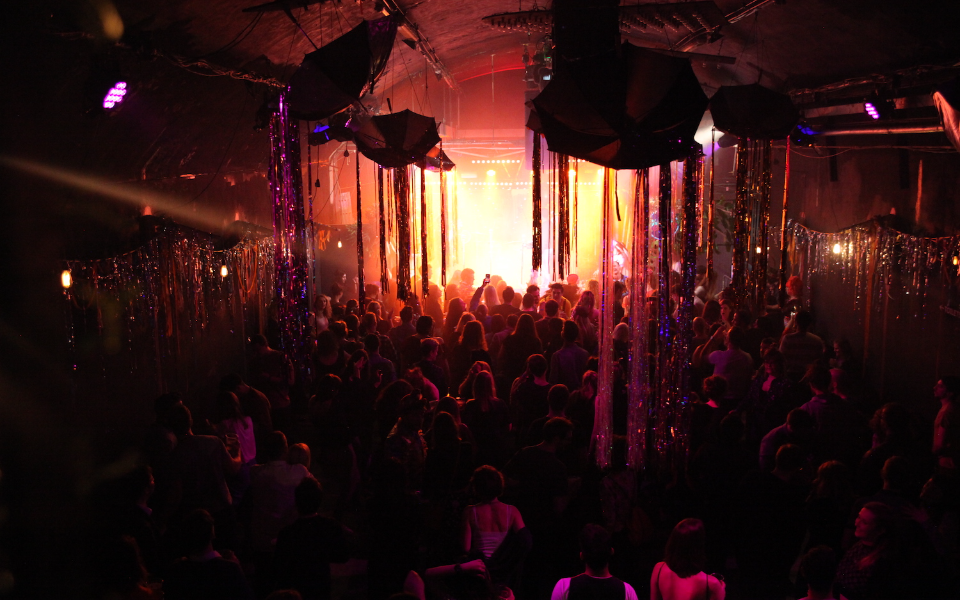Vault Festival: Our new London venue will be better than Edinburgh Fringe

After losing their iconic Waterloo venue last year, Vault Festival – the UK’s second-largest arts festival – has found a new home in zone 1. Founder Andy George talks to Adam Bloodworth about why 2024 is about “changing, not just replicating” the formula
Imelda Staunton, Emma Corrin and the Bridgerton cast were some of the gamut of A-Listers rallying to save Vault Festival when landlords turfed them out of their home this year to prioritise commercial work.
It had become an open secret that very famous actors hung out at the Vault, the UK’s second-largest festival behind the Edinburgh Fringe. Some of them started their careers at the festival, which celebrates new acting talent and ran for ten years in Waterloo.
“They’re people who see how difficult it is to be an actor or artist or have been on that journey themselves,” festival founder Andy George tells City A.M. “They felt like genuine endorsements and very genuine pleas for help.”
In subterranean tunnels below Waterloo, Vault Festival established itself as one of the capital’s mightiest attractions. Staging thousands of shows to almost half a million people, it boasted a unique business model that allowed new artists and writers to put on shows without bankrupting themselves. Two thirds of the cost of a show were paid for by ticket fees and, being located slap bang in central London, footfall was high.

But pinning down another venue in Zone 1 with the same scope for multiple performances to happen at once and a 3am licence for a spacious bar area seemed vanishingly unlikely. The arts world had been on tenterhooks for news about the festival’s future – until last week when the surprising update arrived that a venue has been confirmed to open in the spring. It will have a similar amount of performance spaces, be in zone 1, with good travel connections, and there are “good conversations” with the council over a late licence.
“When I got the news I was walking by the river and did a little dance,” says George. “That moment was special. Shit got real, these ideas we’ve been dreaming and thinking about can happen, this can be a reality. Very emotional, very exciting.” “It feels like an opportunity to elevate what we’re doing by taking the quality of our work up, and by doing so we can hopefully enable artists to take the quality of their work up as well. It feels like a great evolution of where we are rather than replicate where we are.”
Venue details including the location are under wraps until the new year but following communication breakdowns with the landlord at The Vaults in Waterloo George says conversations with the new building’s owners have been “very positive”. “We wanted to stay as central as we could,” he says. “The artists we present often get pushed to the fringes of the city so being in that location, we’re making it as easy as possible for audiences to stumble across new artists they may not have heard about before.”
The big news is that the new venue will be open all year, with the Vault Festival a headline attraction for a month or so at some point in the year, with the business model “remaining festival-led”. The bigger venue will provide “more capacity to generate revenue but also more regular work.”
I think we are the UK’s leading arts festival because I think we are doing things that the Fringe are watching
Andy George, founder of Vault Festival
So what is new? George is tight lipped but repeats Vault’s mission statement about levelling up the arts industry, which is famously full of nepotism, by providing a genuinely accessible space with leg-up opportunities for creatives from lower-income backgrounds and who are systemically disadvantaged in other ways. The business model will change but the idea of two thirds of a show being paid for by a venue was ground-breaking.
“It’s an incredibly difficult time to be an artist in the UK at the moment and it’s only going to get harder while we have the current policies around funding so we want to use this as an opportunity to evolve and change, not just replicate. We want to improve what we’re doing, particularly for the team but also the artists who are presenting with us. What opportunities can we provide that actually have real meaning and weight behind them, not just superficial opportunities.”
“It’s all about how do we work in the best way possible that gives the greatest impact for the people involved in it and for society while acknowledging we work in a capitalist society. We need to make money at the same time so we’re striving towards a model that is as fair as it possibly can be.”
Funding cuts have ultimately forced Nozstock festival to call it quits for next year, while the London Mime Festival have shuttered after two decades, citing rising costs. That isn’t to say there aren’t arts organisations experimenting with different funding models beyond governmental and local council funding.
The new Aviva Studios in Manchester is the latest venue to experiment with adopting a corporate brand name to generate cash. George won’t say how the funding model will change but confirms that it will, not ruling out taking the brand-in-name approach in the future.
At this stage, it’s all about “opening up collaborations and how we work to make better networks for artists.” The beleaguered Edinburgh Fringe, where costs have become extortionate for an artist to put on a show, from accommodation to venue hire, “does need to change,” says George. “The Fringe is on the precipice, it could go one way or the other… It’s just whether or not there’s the cogs to make it change before it tips over.”
Meanwhile, the Fringe, the world’s biggest arts festival, are knocking down Vault’s door for ideas and inspiration – and a “collaboration” of some form between the festivals to enable artists may be in the works. “I think we are the UK’s leading arts festival because I think we are doing things that the Fringe are watching,” says George, summing up the scale of Vault’s success.
Read more: The Crown’s Emma Corrin criticises closure of ‘integral’ London arts event
“We speak with the Fringe and they tell us they admire what we’re doing. I think what we’re trying to do is do things slightly differently and challenge convention and disrupt the status quo and go actually, ‘why don’t we do it this way?’ I think the Fringe has become increasingly difficult, with costs spiralling up for artists to make it viable, particularly for artists from underprivileged demographics. They don’t have the ability to fail and it not be the end.
“When we talk about leading, we want to be trying to lead the way in how there may be a different way of doing things in the future. A lot of our recent campaign was around access equipment. Festivals have a unique opportunity to lead the way because they disappear and come back again. For the artists we’re presenting and in the manner in which we’re trying to do it, I feel confident in saying we’re the UK’s leading festival – but I appreciate the work that goes into making things like the Edinburgh Fringe. And we can only be a challenger if there’s something else already established.”
Oh, and Vault throws great parties too. Another 3am licence in nightlife-starved London? Just another reason to get very excited indeed about the spring.
Vault Festival will reveal more about their 2024 venue and future plans in the new year. Stay updated on Instagram and their website
Read more: Vault Festival, London’s take on Edinburgh Fringe, desperately needs our help
Read more: Exclusive: Bridgerton cast rally to save vital London arts event from closure
